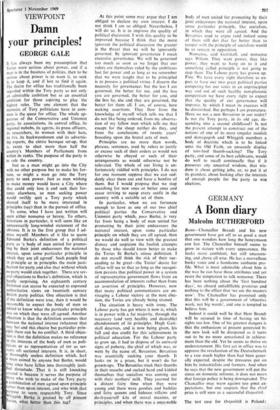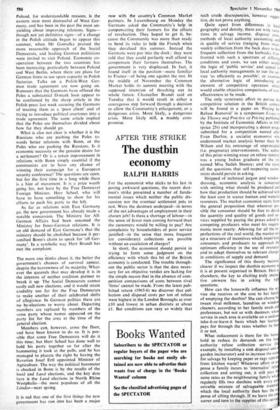GERMANY
A Bonn diary
Malcolm RUTHERFORD
Bonn—Chancellor Brandt and his new government have got off to so good a start that one wonders how long the honeymoon can last. The Chancellor himself seems to grow in stature with every appearance. He looks more confident, but still unassum- ing, and above all wise. He has a marvellous husky voice and a handsome sunburnt pro- file. What is most admirable about him is the way he can have these attributes and yet resist the temptation to talk nonsense. There has been nothing about the 'first hundred days', no absurd unfulfillable promises and nothing to the effect that 'we are the masters now'. The Chancellor has promised only that this will be a government of 'objective work, not big words', and one is tempted to believe him.
Indeed it could well be that Herr Brandt will be accused in time of having set his sights too low. One of his greatest dangers is that the enthusiasm at present generated by the new look will be dissipated as it turns out to be no more sensational in achieve- ment than the old. Yet he seems to thrive on understatement. His first act in office was to approve the revaluation of the Deutschemark to a rate much higher than had been gener- ally expected, despite the pressures put on him by industrialists and farmers. And when he says that the new government will put the stress on domestic reforms, it does not mean that foreign policy is being downgraded. The Chancellor may warn against too great ex- pectations, but one suspects that the chief prize is still seen as a successful Ostpolirik.
The test case for Ostpolitik is Poland: Poland, for understandable reasons, is the eastern state most distrustful of West Ger-
many, and has been in the past the most un- yielding about improving relations. Signs— though not yet definitive signs—of a change in the Polish attitude began to appear this summer, when Mr Gomulka praised the more reasonable approach of the Social Democrats, and leading German politicians were invited to visit Poland. Economic co- operation between the two countries has been increasing, particularly between Poland and West Berlin, where there are plans for German firms to use spare capacity in Polish factories. Talks on a Polish-West Ger- man trade agreement are now going on. Rumours that the Germans have offered the Poles a substantial D-mark loan appear to be confirmed by the sharp article in the Polish press last week accusing the Germans of treating them as a 'poor client' and of trying to introduce political overtones into a trade agreement. The same article implied that the Poles are themselves divided about how far they should go.
What is also not clear is whether it is the Russians who are pushing the Poles to- wards better relations with Bonn, or the Poles who are pushing the Russians. Is it economic necessity or the genuine desire for a settlement? Or is a token improvement in relations with Bonn simply essential if the communists are to have any chance of winning their campaign for a European security conference? The questions are open, but for the first time in a long while there is a hint of movement. It is a prize worth going for, not least by the Free Democrat Foreign Minister, Herr Scheel, who will have to have something to show for his efforts to push his party to the left.
As far as • relations with East Germany go, the new government has already made a notable concession. The Ministry for All- German Affairs had been renamed the Ministry for Inner-German relations. It is an old demand of East Germany's that the ministry should be abolished because it per- sonified Bonn's claim to speak for 'all Ger- many'. In a symbolic way Herr Brandt has met the complaint.
The more one thinks about it, the better the government's chances of survival appear, despite the narrowness of its majority. What- ever the quarrels that may develop it is in the interests of neither coalition partner to break it up. The Social Democrats cannot easily call new elections, and it would strain credulity too far for the Free Democrats to make another of their celebrated shifts of allegiance. In German politics there are no by-elections to worry about. Departing members are replaced by members of the same party whose names appeared on the party list for the area at the time of the general election.
Members can, however, cross the floor, and have been known to do so. It is pos- sible that some Free Democrats will do it this time; but Herr Scheel has done well to hold his party together so far after the hammering it took at the polls, and he has managed to placate the right by having the Bavarian Josef Ertl appointed Minister of Agriculture. The way the political barometer is checked in Bonn is by the results of the local and Land elections, and the -key date here is the Land elections in North Rhine Westphalia—the most populous of all the Liinder—next spring.
It is sad that one of the first things the new government has run into has been a major
row with the country's Common Market partners. In Luxembourg on Monday the Germans asked the Community's help in compensating their farmers for the effects of revaluation. They hoped to get it, be- cause the Community was more than ready to bend its rules to help the French when they devalued this summer. Instead the Germans were put into the dock : they were told that they could perfectly well afford to compensate their farmers themselves. The government is very displeased. In fact, it found itself in the position—more familiar to France—of being one against the rest. In the middle of November the Common Market holds its summit meeting with the supposed intention of thrashing out its whole future. Chancellor Brandt said on Tuesday that it would result in either a courageous step forward through a decision to allow the Community's enlargement, or a dangerous crisis. More likely, a dangerous crisis. More likely still, a muddy com- promise.















































 Previous page
Previous page